Internalizing My Role and Calling
Part 2 of the series How to be yourself, with help from Disney/Pixar (Thinking about Identity and the Inner Voice)
I have written several posts for Thinking in the Light at this point. Some of them were fairly easy to write, while others involve pages of notes, dense outlines, and handwritten paragraphs I constantly modified. The post on Immanuel Kant was one of these latter type. So is this post on Moana. I will leave it up to you to decide whether it is a strength or a weakness that I go to the same level of obsessive detail when writing about a notoriously difficult philosopher and a children’s movie.
Moana is a great movie, an animated musical that can be compared with Disney classics like Cinderella and The Little Mermaid. The animation is beautiful; the songs are both catchy and clever; and the story and song lyrics are all united by a consistent theme. And that theme, conveniently for this series, is identity. Not only does it define the arc of Moana herself, but it also factors significantly into the stories of Maui and multiple antagonists. (And since I will be discussing all of this, here is a good place for a spoiler alert.)
There are three concepts intertwined at the heart of Moana‘s account of identity: a role, a calling, and an inner voice. The first two could be external sources of identity for Moana. That is, they potentially define her by pointing to something outside of herself. The third, the inner voice, is by definition internal. Moana is torn between these sources of identity and is trying to sort them out. This tension drives the drama of the story. I will look at each in turn and examine what Moana has to say about them.
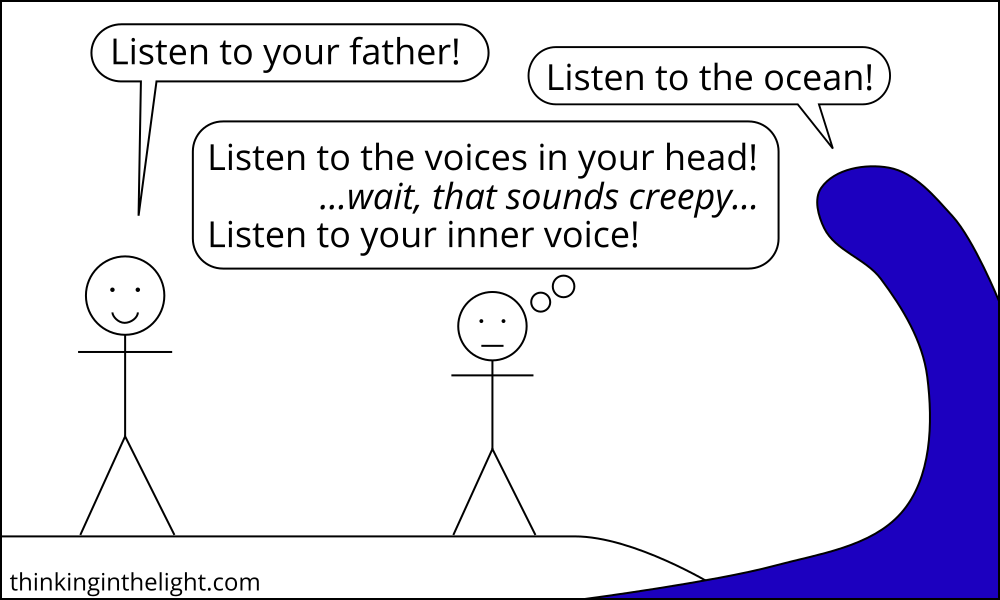
First, Moana has a role she has been born into: her father is the chief of the people, so this will one day be her position. Her parents—especially her father—emphasize this role and how it affects who she is and what she does. Moana wants to go off sailing the ocean, but due to its danger the villagers do not go beyond the island’s reef. Her father tells her that rather than sailing off elsewhere, “you must learn where you are meant to be.” As the next chief of the village, Moana has an obligation to stay and lead them. “You are the future of our people, Moana. They are not out there [across the ocean]. They’re right here [on the island]. It’s time to be who they need you to be.” He explains that while this may be disappointing now,
You’ll be okay
In time you’ll learn just as I did
You must find happiness right
Where you are
This role, then, is an external source of identity. It is not a position she chose, but one she was born into. Nevertheless, the role defines and constrains her. She is the future chief, so she must live accordingly.
Moana wrestles with this role, but not in the way one might expect. An interesting aspect of the movie is how the role is actually attractive to her. This is not a dystopian future where the tyrannical government is imposing itself upon her. Nor is it an oppressive patriarchy that ensures she stays in a woman’s place. Instead, she lives in a good society and recognizes the ways she could benefit the people:
I can lead with pride, I can make us strong
I’ll lead the way
I’ll have my people to guide me
We’ll build our future together
Where we are
Since the society is so good and Moana is well-placed in it, the tension with her role arises simply because the people stay put, while she is drawn to the sea.
This brings up the second source of identity, her calling. In its basic sense, a calling requires an external agent who calls.
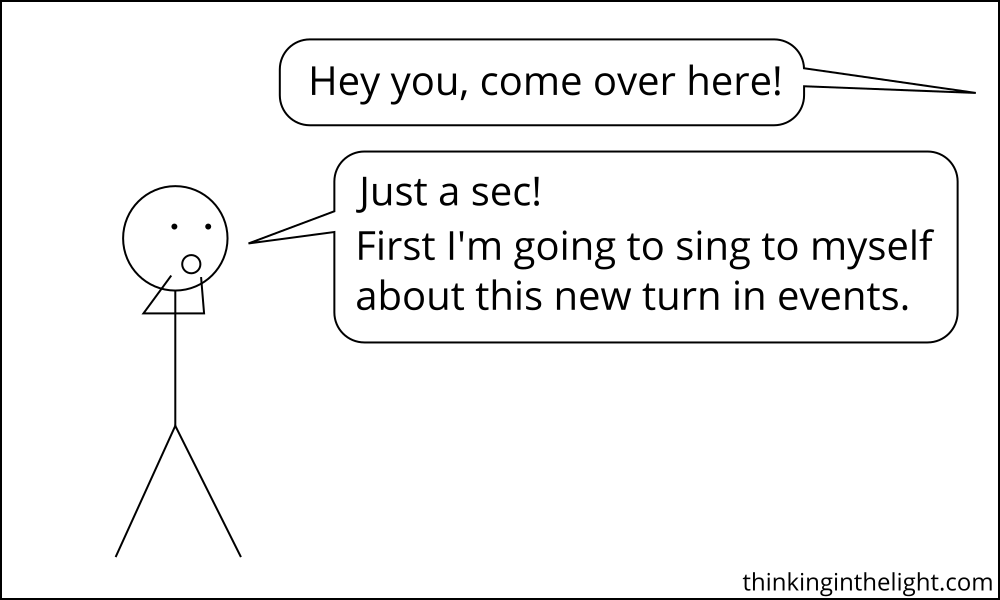
When Moana discusses this external sense of calling, it speaks of being chosen. The movie begins with the legend of Maui stealing the heart of Te Fiti and an explanation that someone needs to take the heart back. Right after this we see the ocean—who is a character in the movie—give the heart (a green stone) to Moana. It chooses her for the task. This act of choosing is reiterated several times: both Moana and her grandma speak of her being chosen by the ocean, and the ocean itself keeps helping her along the journey.
This calling or chosenness is an external source of identity, because it is not originating from Moana herself. The call comes from the ocean, a god-like being (in a polytheistic sense). It may be a playful, helpful character, but it is also superhuman and guardian of the item that will restore health to the world. So its choice of Moana is one she should listen to. If Moana is the chosen one, then this identity determines what she should do: go on the quest to return Te Fiti’s heart.
Just as she struggles with her role, Moana also struggles with this call. In particular, she wonders why the ocean chose her. She doesn’t feel up to the task at times, but in order to stay motivated she tells herself, “The ocean chose me for a reason.” This pep talk does not work forever, though, and eventually after a big setback she openly questions the ocean’s reasoning: “Why did you bring me here? I’m not the right person. You have to choose someone else.”
The third source of identity, the inner voice, is the source in Moana that receives the emphasis. The character who advocates for it is Moana’s grandma. In response to her father’s emphasis on her role, the grandma tells Moana to look inward:
You are your father’s daughter
Stubbornness and pride
Mind what he says but remember
You may hear a voice inside
And if that voice starts to whisper
To follow the farthest star
Moana, that voice inside is
Who you are
And the movie is clear that the grandma is right. Identity is to be found from within, not from without. This is emphasized in what Moana says to two other characters.
At one point Maui explains to her that his human parents threw him into the ocean. He was rescued by the gods and made a demigod. Moana responds that while this is a remarkable backstory, and “maybe the gods found you for a reason,” the fact is that this story doesn’t define him: “But the gods aren’t the ones who make you Maui, you are.” Maui’s identity is determined by himself, not the gods.
Even more significantly, the movie’s ultimate adversary, the lava-monster Te Ka, turns out not to be a villain but is a Te Fiti who has forgotten who she is. As Moana realizes this is the case, she calms the raging monster by singing to her:
I have crossed the horizon to find you
I know your name
They have stolen the heart from inside you
But this does not define you
This is not who you are
You know who you are
Who you truly are
Once again, Te Fiti must not let what others have done determine her identity, but she must look inside and remember who she is.
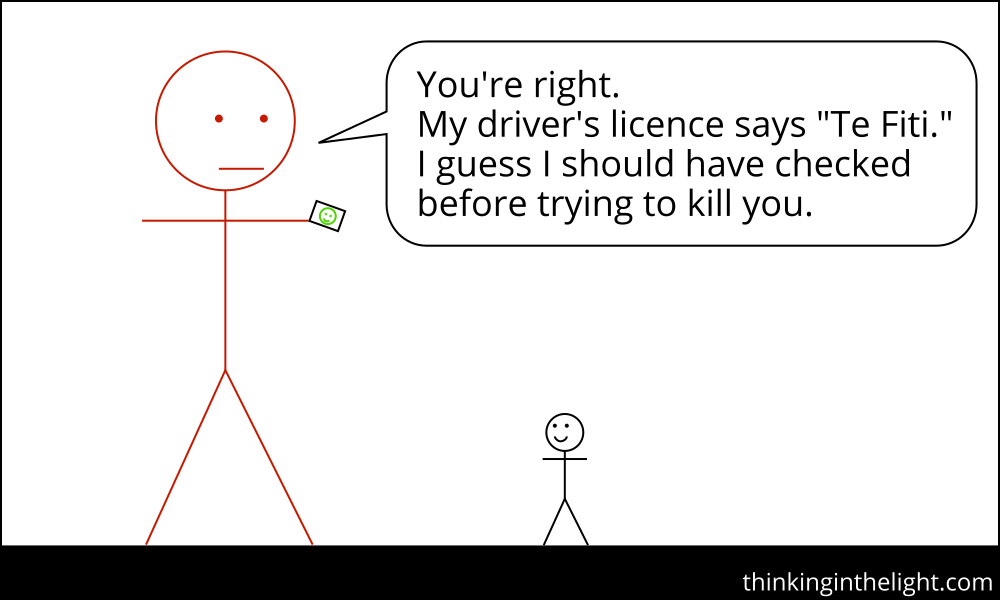
The message is that I determine my identity, not someone else. But as the movie makes clear, this does not mean that I must reject every external source of identity. In fact, in Moana’s case it is by listening to her inner voice that she unites the sources of identity discussed previously.
After her first, failed attempt at getting past Te Ka, Maui leaves her, and she gives the heart back to the ocean, who also leaves. She is about to give up and sail home, but she stops. The spirit of her grandma sings to her:
The people you love will change you
The things you have learned will guide you
And nothing on earth can silence
The quiet voice still inside you
And when that voice starts to whisper
Moana, you’ve come so far
Moana, listen, do you know who you are?
Moana answers by first describing her calling and her role:
Who am I?
I am a girl who loves my island
And a girl who loves the sea
It calls me
I am the daughter of the village chief
We are descended from voyagers
Who found their way across the world
They call me
As she says here, Moana feels the call of the ocean and of her people. But as she goes on to clarify, they are not actually external sources of identity. They define her not because they place constraints on her but because she feels them to be a part of herself. They are a part of her identity because the inner voice has declared them to be:
And the call isn’t out there at all
It’s inside me
It’s like the tide, always rising and falling
[To her grandma:] I will carry you here in my heart
You remind me
That come what may, I know the way
I am Moana
Her identity is herself. It is what the inner voice declares. And one of the things the inner voice can do is internalize the role and the calling, thereby making them a part of Moana. As seen with Maui and Te Fiti, however, the implication is that if these sources were not endorsed by the inner voice, they would not pertain to her identity.
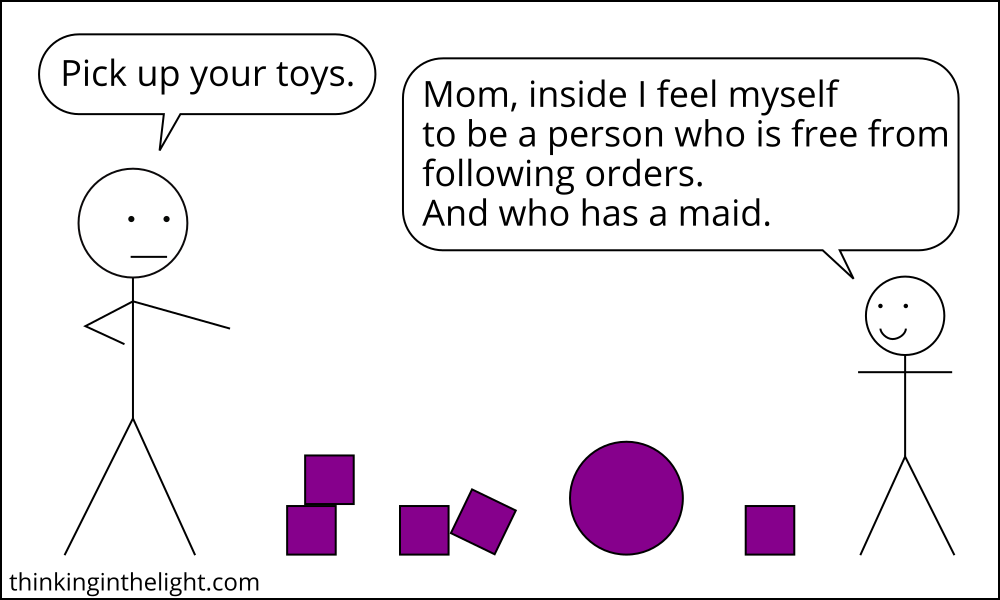
This internalization of Moana’s role and calling can be seen in the way the movie uses the word “call.” As I said before, the ocean as a character is calling Moana to perform a task, and when this external call is referenced, the movie uses the term “chosen.” But there is also an internal sense of calling, and when Moana uses the word “call,” this is what she has in mind:
I come back to the water, no matter how hard I try
…
To the place I know, where I cannot go, where I long to be
See the line where the sky meets the sea? It calls me
Here the call is metaphorical. It is a synonym for her longing. This is not the ocean as a character choosing Moana, but the ocean as an object looking attractive. Something outside me “calls” in the sense that my desire reaches out to it and I feel drawn to it. It is a calling from within, not from without.
Moana is suggesting, then, that the inner voice turns external things into internal sources of my identity. The next question to ask is what this means.
Perhaps Moana could be seen as recognizing that she cannot just follow rules simplistically—”stay on the island!”—but she must make judgments as to what to do. This recognition would be a good one. For example, being a truthful person is not rigidly refusing to lie—including to Nazis asking if you are hiding Jews in your house. Similarly, it seems wise of Moana to propose that the rule forbidding sailing beyond the reef needs to be reexamined in light of the disappearance of fish within it. However, a recognition of the need for flexible rules is not an issue of identity, nor is it best addressed by an exhortation to look inwards, so this is not likely to be the focus of the movie.
The message seems to be that there is something there inside of myself to appeal to. Moana is at least clear what it is not, since the inner voice is contrasted with a crass external showiness. This latter is exemplified by Tamatoa, the monstrous crab who covers himself in glittering objects.
I was a drab little crab once
Now I know I can be happy as a clam
Because I’m beautiful, baby
Did your granny say listen to your heart
Be who you are on the inside
I need three words to tear her argument apart
Your granny lied!
I’d rather be
Shiny
It is easy to agree that we should focus on an inner self if the alternative is being superficial. This does not go very far towards answering, however, what it is on the inside that we are looking towards. We still have to figure out what the inner voice is.
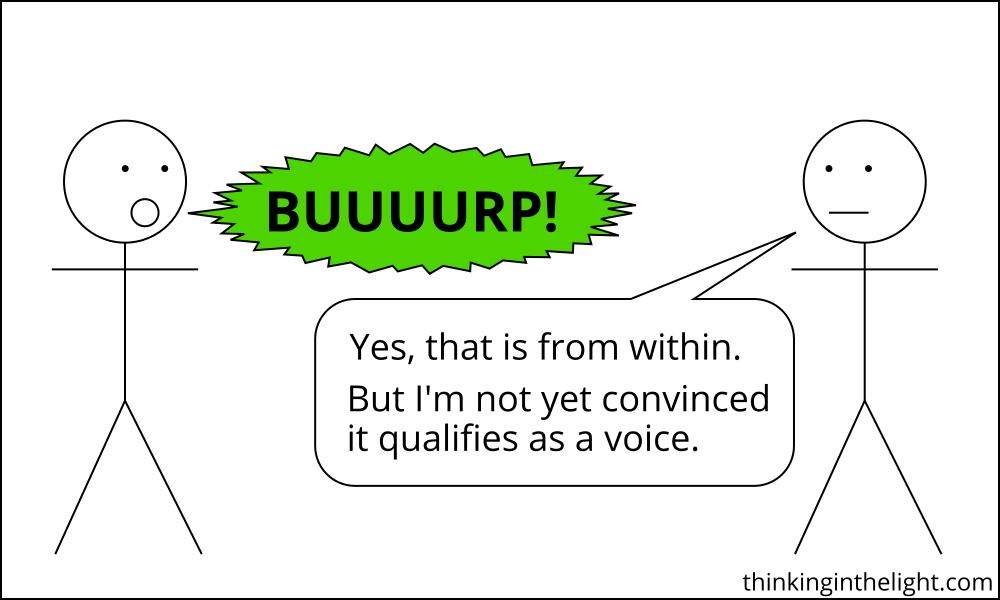
Based on what else the movie says, the most likely candidate for the inner voice is my desires. Both Moana and her grandma imply this. As noted above, Moana equates the internal sense of “call” with her desires, and in the same song she also equates these with the inner voice:
I know everyone on this island has a role on this island
So maybe I can roll with mine
I can lead with pride, I can make us strong
I’ll be satisfied if I play along
But the voice inside sings a different song
What is wrong with me?
…
The line where the sky meets the sea? It calls me
Similarly, right before her grandma exhorts Moana to pay attention to her inner voice, the grandma describes her own independence in terms of knowing her desires:
The village may think I’m crazy
Or say that I drift too far
But once you know what you like, well
There you are
Desires are a plausible candidate for something we label an “inner voice.” However, if the inner voice is simply my desires, it is not clear why this is a source of identity. What about my desires says that they define me and that I should act on them? For example, consider the two senses of “calling” I have discussed, the external and the internal. Suppose that I have a calling from God—that God tells me I need to be a plumber. (For the sake of this illustration, suppose that this calling is obvious. An angel literally appears to me and says, “Hey, God wants you to be a plumber!”) This external sort of calling seems like something I ought to act on. God, as creator of everything, is the sort of being with the authority to say how things are going to be—including what I am going to be. A calling from God determines my identity.
On the other hand, if I have a calling from my desires, it is less clear why I ought to act. Naturally, it is quite clear why I do act—I want to—but is there any reason I should, especially if there are other factors pulling me in a contrary direction? Suppose that I desperately long to be a plumber, but I have a large family to feed and all the good money is in beekeeping, my current occupation. Can I say that my desire defines me, that I am a plumber, and use this as a justification for abandoning my obligations and living it up amidst the leaky pipes? Maybe there are times where such a scenario is justified, but I tend to think that morality should win over desires. Even speaking in terms of being “called” is potentially misleading here, since in some ways it is taking my desires and pretending they are the voice of God.
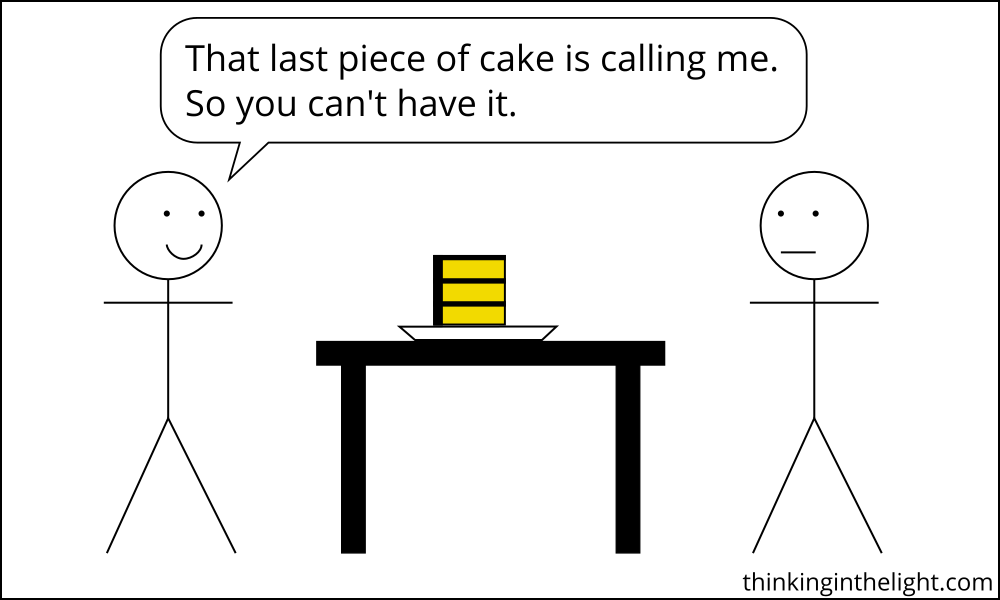
Now, I’m not entirely sure if Moana is meaning to say that the inner voice is simply my desires. Perhaps instead it is something like a sense of myself. But, in turn, we would then need to explain what this sense is. And this is where I will leave things—with a question. In contemporary American culture, we often speak of listening to my inner voice (or some synonym for it), but it is rarely clear to me what we mean by this. If it is going to be the thing that supplies our identity, we are going to have to do a lot more work in clarifying what exactly it is. As an analogy, students often complain when I speak of an objective, culture-transcending morality. “How would that work?” they ask. And this is a good question to ask, one which requires a lot of thought to answer. I would like to suggest that the concept of the inner voice, though we treat it as pointing to something obvious, similarly requires a good deal of thought before it is a concept in which we can rest our identity.
Before I end here, there is one final aspect to highlight in Moana‘s account of identity, one that is best seen in contrast to Pinocchio. In that movie, I’m not supposed to look inside myself, but I am instead supposed to help others, to do what is right. That is, there is an opposition of myself versus morality, and a sense that I must prioritize one over the other. It is either/or. In Moana, however, I am not supposed to look to others for my identity, but I must look inside myself. And it is precisely by doing this that I will help others.
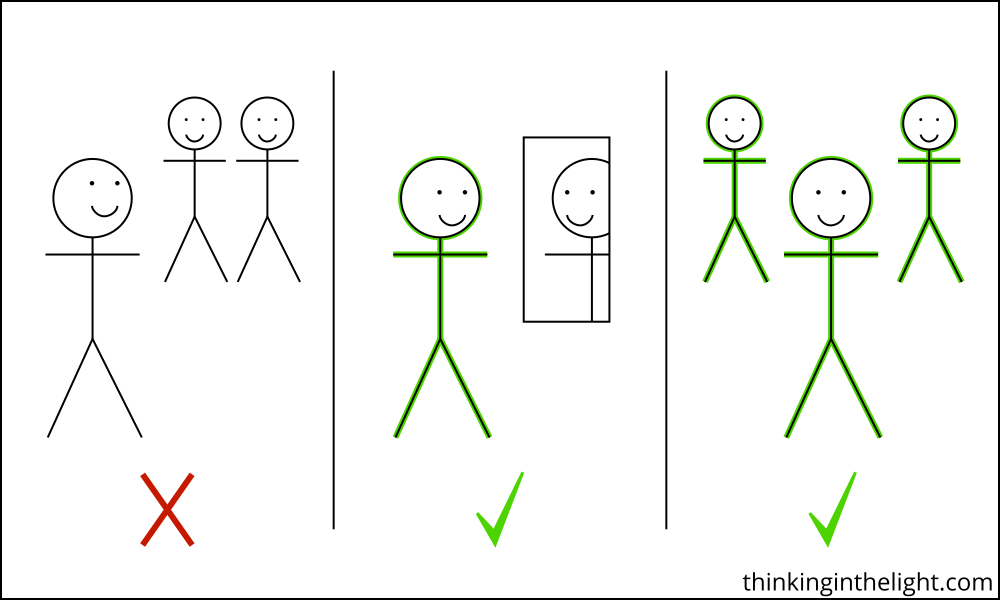
Moana saves her village by listening to herself and not doing what others would have her do. In this understanding of identity, there is no opposition between a self-focus and helping others, as there is in Pinocchio.
From my experience interacting with my students, this is a popular position to hold. My question is exactly how this works. Is it better to think of a focus on myself as being opposed to acting rightly or as the means to ethical action? I will examine this question more in the next post in the series, as I head for chillier waters than those Moana sails on.
Share this post or sign up for future posts:
Bibliography:
- Moana. Walt Disney Animation Studios, 2016. (Lyrics to Where You Are, How Far I’ll Go, and Shiny are copied from LyricFind.com, via Google search.)
